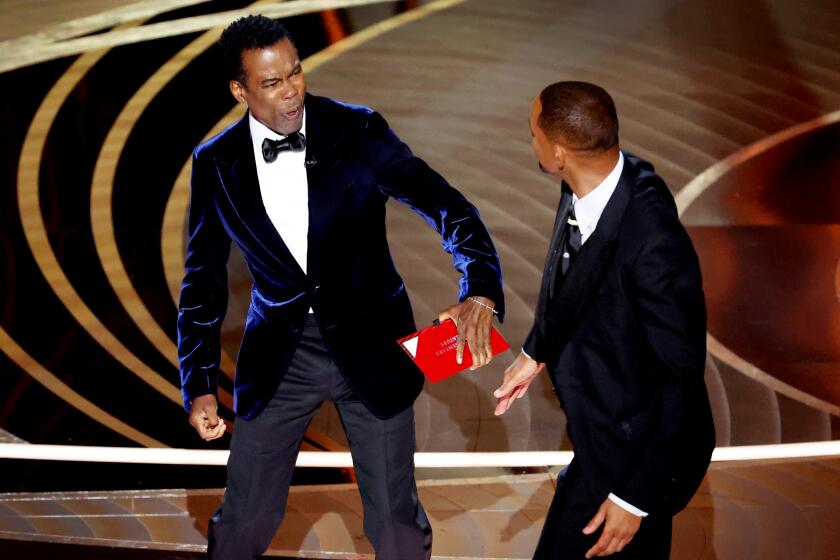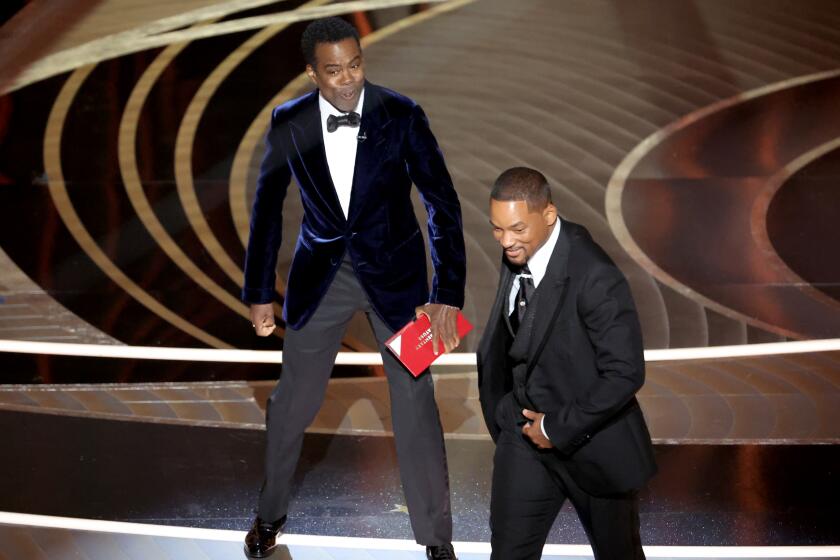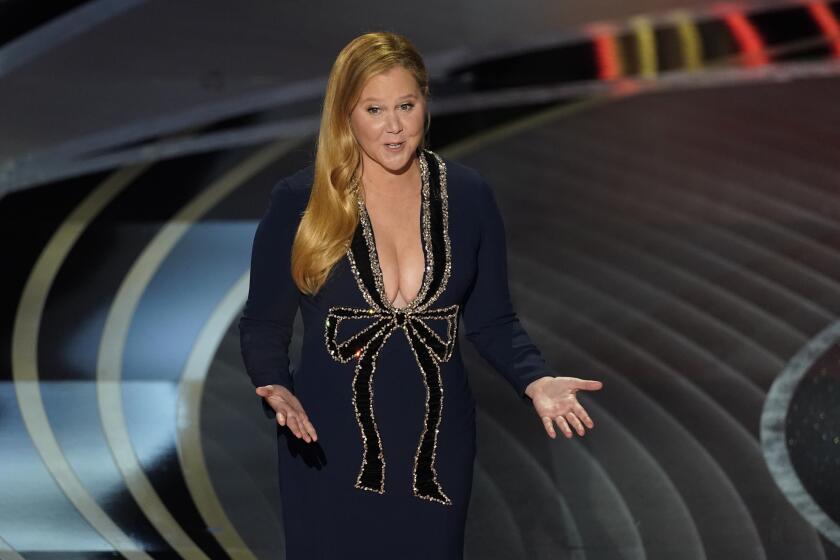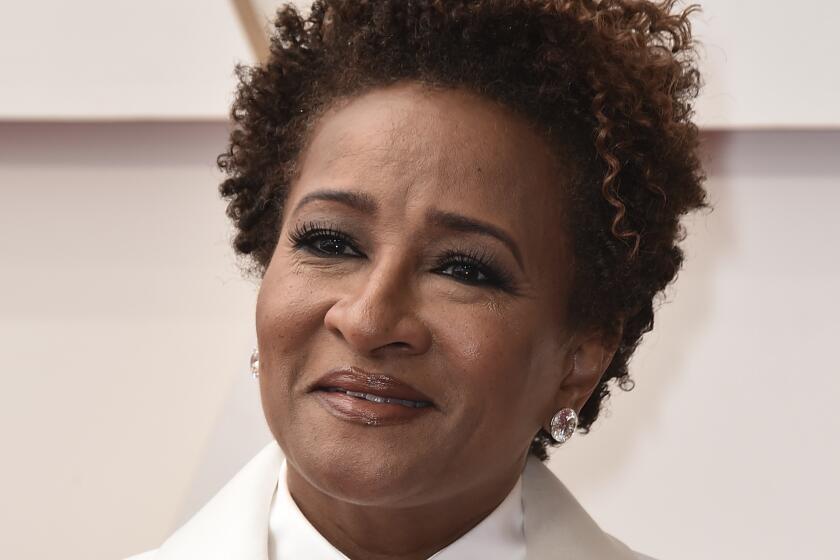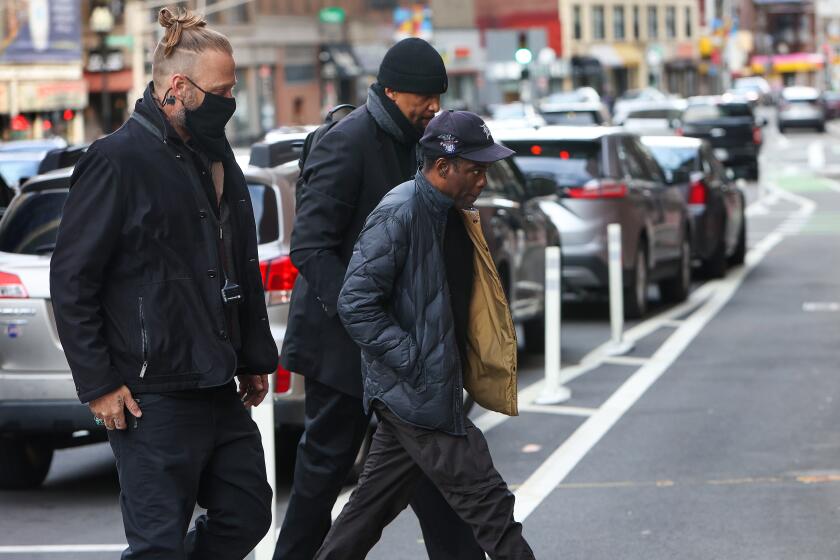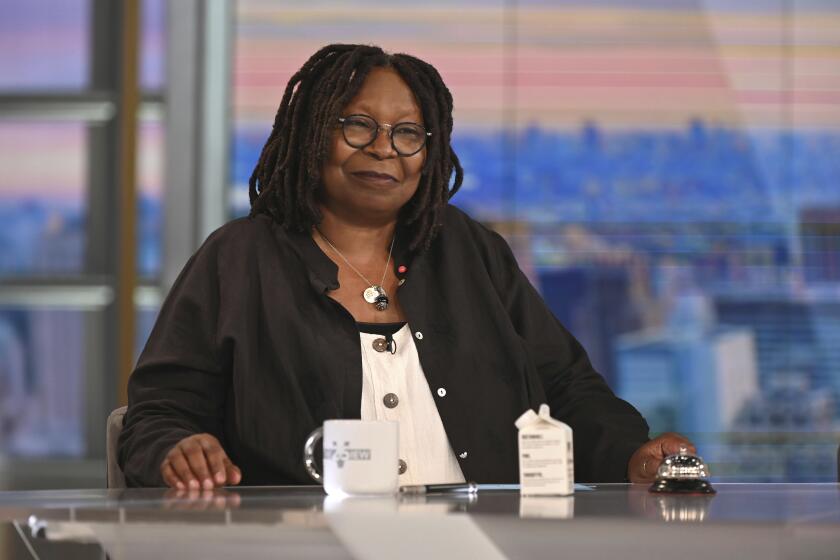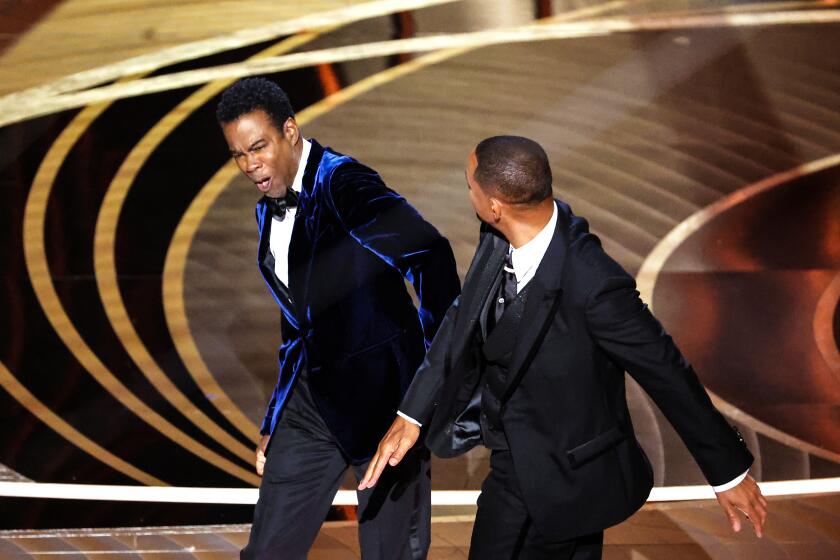Did Will Smith refuse to leave? Questions swirl around that infamous Oscars slap

Days after Will Smith slapped Chris Rock at the Oscars, the motion picture academy still was reeling from the blow as leaders faced growing scrutiny over their handling of the altercation that derailed the Sunday ceremony and shocked viewers at home.
Questions continued to swirl even after the academy’s announcement Wednesday that it had started disciplinary proceedings against Smith. Competing narratives of what happened inside the Dolby Theatre in the fraught moments after the incident — and why Smith was allowed to stay and accept his lead actor Oscar for “King Richard” — shifted focus from the men onstage to the leaders behind the scenes who were calling the shots on Hollywood’s biggest night.
The academy, which has faced fierce criticism over the incident, including from its own members, has placed some of the responsibility on Smith, suggesting the actor had refused a request to leave the Dolby Theatre after striking Rock.
“While we would like to clarify that Mr. Smith was asked to leave the ceremony and refused, we also recognize we could have handled the situation differently,” the group said in a statement Wednesday, calling Smith’s conduct “a deeply shocking, traumatic event to witness in-person and on television.”
On Wednesday, the film academy announced it has launched disciplinary proceedings against Will Smith after he slapped Chris Rock.
But reports Thursday by TMZ, Variety and the Hollywood Reporter, citing anonymous sources familiar with what transpired, cast doubt on the academy’s account. They suggested that the organization’s leaders and the show’s first-time producer, Will Packer, conveyed mixed, and perhaps even contradictory, messages about whether Smith should be removed and furthermore suggested that they never formally asked him to leave.
Neither the academy nor Smith’s representative has responded to questions from The Times about precisely what transpired that evening. Packer also did not respond to a request for comment.
Via email on Wednesday, one academy governor, who declined to speak on the record because of the sensitivity of the situation, chalked up the confusion to what the governor called “the fog of war.”
If Smith was asked to leave, critics wonder, why was he allowed to accept his Oscar? Defenders point to what they see as a racial double standard.
After the incident, Smith was seen conferring with his publicist and being comforted by Denzel Washington, Tyler Perry and Bradley Cooper, among other well-wishers. Meanwhile, heated discussions went on behind the scenes involving Academy of Motion Picture Arts and Sciences President David Rubin, Chief Executive Dawn Hudson, Packer and Smith’s representatives over how to handle the situation.
Less than an hour after striking Rock, Smith received a standing ovation and cheers from many in the Dolby when he was awarded the lead actor prize for his performance as the father of tennis stars Venus and Serena Williams in “King Richard.” In a tearful, nearly six-minute acceptance speech, the actor suggested that, like his character in the film, he had been driven by the impulse to protect his family and offered an apology to the academy and his fellow nominees, but not to Rock.
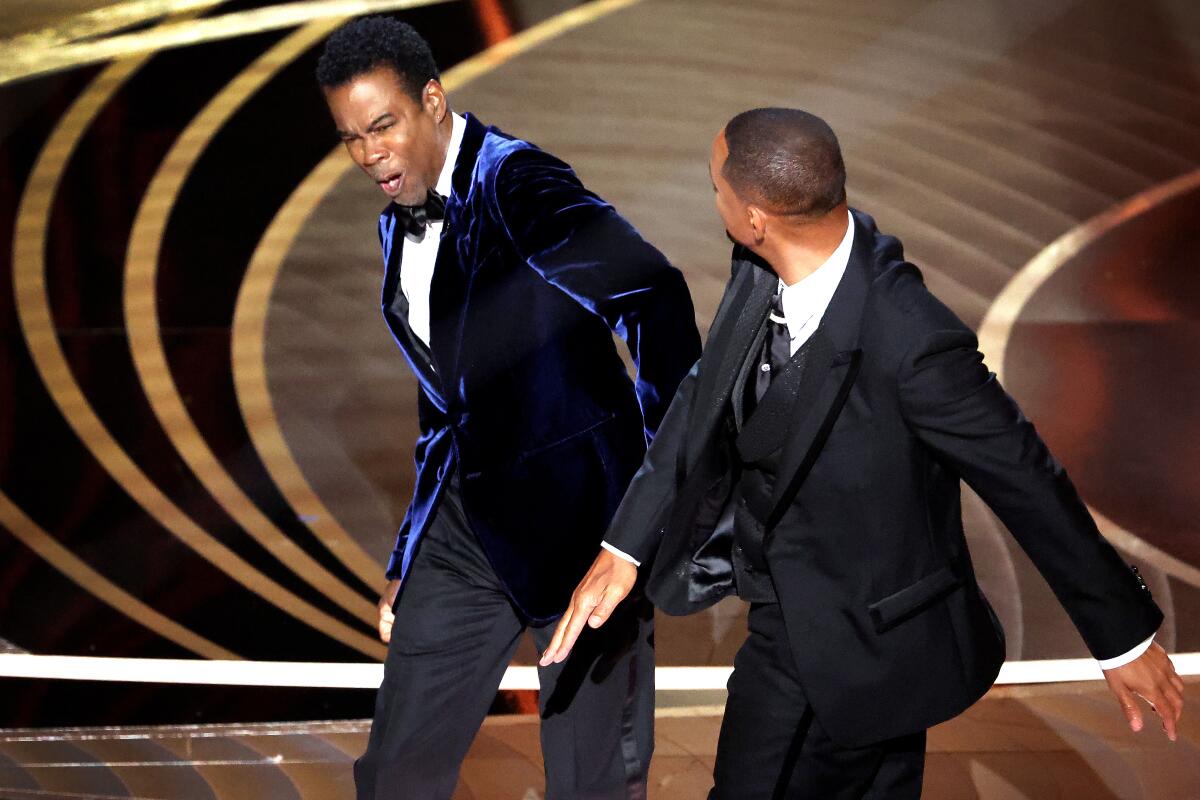
In a preview of an interview with “Good Morning America” slated to air Friday, Packer revealed that Los Angeles Police officers were prepared to arrest Smith following the altercation, but Rock declined to press charges. “They said … ‘We’re prepared to get him right now. You can press charges. We can arrest him,’” Packer said. “They were laying out the options, and as they were talking, Chris was being very dismissive of those options. He was like, ‘No, I’m fine.’ He was like, ‘No, no, no.’”
Since Sunday, conversation in Hollywood has been largely dominated by the shocking eruption of violence onstage, plunging the academy into an unprecedented crisis as it finds itself in an increasingly volatile dispute with one of the industry’s most bankable and well-liked stars.
Before an emergency meeting of its board of governors Wednesday, academy leaders Rubin and Hudson spoke with Smith by Zoom, according to a Variety report Thursday that cited unnamed sources. The academy went on to say that it had initiated disciplinary proceedings against Smith “for violations of the Academy’s Standards of Conduct, including inappropriate physical contact, abusive or threatening behavior and compromising the integrity of the Academy.”
‘Waiting for this sickening feeling to go away,’ wrote Amy Schumer, who co-hosted the 2022 Oscars with Regina Hall and Wanda Sykes.
The academy said the ultimate repercussions for Smith — “which may include suspension, expulsion or other sanctions permitted by the Bylaws and Standards of Conduct” — would be voted on by the group’s 54-member board, which includes such notables as Steven Spielberg, Ava DuVernay and Laura Dern, at a meeting on April 18. Smith was offered 15 days to provide a written response.
Meanwhile, two of the show’s co-hosts, comedians Amy Schumer and Wanda Sykes, offered their reactions to the incident.
In an Instagram post Wednesday, Schumer wrote: “Still triggered and traumatized. I love my friend @chrisrock and believe he handled it like a pro. … the whole thing was so disturbing.”
On Ellen DeGeneres’ show, Oscars host Wanda Sykes unpacks her thoughts about the slap heard ‘round the world. Also, she wonders, where is her apology?
On Ellen DeGeneres’ daytime talk show Wednesday, Sykes said she “felt so awful for my friend Chris, and it was sickening. I physically felt ill, and I’m still a little traumatized by it.”
Sykes also criticized the decision to allow Smith to remain in the Dolby to receive his Oscar after slapping Rock.
“For them to let him stay in that room and enjoy the rest of the show and accept his award, I was like, ‘How gross is this? This is just the wrong message,’” she said. “You assault somebody, you get escorted out the building and that’s it. For them to let him continue, I thought it was gross. Plus, I wanted to be able to run out after he won and say, ‘Unfortunately, Will couldn’t be here tonight ...’”
While performing at the Wilbur in Boston on Wednesday night, comedian Chris Rock said he was still unpacking the Will Smith incident at the Academy Awards.
Rock himself made his first public comments about the incident at a stand-up show in Boston on Wednesday evening. “I’m still kind of processing what happened,” he told the crowd, who greeted him with a standing ovation. “At some point, I’ll talk about that s—. And it will be serious and funny.”
Further controversy emerged when one of the producers of “Summer of Soul” — which Rock named the Oscar winner for documentary feature moments after being slapped — posted a now-deleted Twitter thread excoriating Smith for violence that cast a pall over the night and Rock for making disrespectful comments.
Joseph Patel, who is of South Asian descent, said he did not realize until after the show that Rock had announced the winners of his category as director Ahmir “Questlove” Thompson and “four white guys.”
“What both Will AND Chris did really stained what should have been a beautiful moment for us,” Patel tweeted. He added: “The reason that makes me so so very angry is because I was so proud to be one of a handful of South Asians to have ever won an Oscar in the history of the award,” Patel said.
Neither Patel nor Rock responded to requests for comment.
It remains to be seen what disciplinary action the academy will take against Smith. On Monday, Whoopi Goldberg, an academy governor, said categorically on the daytime talk show “The View”: “We’re not going to take that Oscar from him.”
But the decision on what measures to take will ultimately be up to the entire board. Since adopting a code of conduct for its members in 2017, the academy has ejected only three members: producer Harvey Weinstein, director Roman Polanski and comedian-author Bill Cosby.
Accepting Will Smith’s apology for slapping Chris Rock at the Oscars, film academy governor Whoopi Goldberg said actor will face ‘big consequences.’
Some have speculated that Smith’s membership could instead be suspended for a certain period of time or that the actor — who has a film coming out later this year from Apple called “Emancipation” — could be barred from presenting at next year’s Oscars. (It is customary for the previous year’s lead actor winner to present the lead actress trophy, as Anthony Hopkins did to Jessica Chastain this year.)
Insiders say it could take three weeks for a final resolution to be reached, as the organization plans to carefully follow the procedures laid out in its bylaws and standards of conduct. (In 2019, Polanski filed a lawsuit against the academy, alleging that it had not followed its own protocols in expelling him, but ultimately he lost the suit.)
Everything we know about the infamous moment at the 2022 Oscars, from the history leading up to the onstage shocker to today’s latest developments.
In a statement issued Monday, Smith called his conduct “unacceptable and inexcusable,” apologizing to Rock and saying, “I was out of line and I was wrong. I am embarrassed and my actions were not indicative of the man I want to be. There is no place for violence in a world of love and kindness.”
Speaking on “The View” Thursday, Goldberg said she believed that Smith had been asked to leave the Oscars, even as she acknowledged that she wasn’t certain. “I wasn’t there — I can’t imagine what was going on back there,” she said. “But I do know that the only person anybody should be focusing on, in my opinion, is Will.”
Times staff writers Glenn Whipp, Mark Olsen and Jen Yamato contributed to this report.
More to Read
Only good movies
Get the Indie Focus newsletter, Mark Olsen's weekly guide to the world of cinema.
You may occasionally receive promotional content from the Los Angeles Times.
